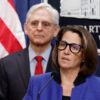
Among the slew of strategy documents from the Obama administration this spring, full of academic analysis and verbal flourishes, Congress has rightly detected a certain lack of substance. Case in point: The question of whether the U.S. government needs a Center for Strategic Communications and Public Diplomacy. According to the National Security Council in its National Communication’s Strategy the answer is “No.” According to the House Armed Services Committee in its report accompanying the National Defense Authorization Act for Fiscal Year 2011 (H.R. 5136), the National Security Council has done very little to state “Why Not?”
The lack of interagency coordination is one of the problems that beset the messaging of the plethora of U.S. government agencies with a slice of the strategic communications, from the State Department to the Defense Department to the Broadcasting Board of Governors, the U.S. Agency International Development, the National Endowment for Democracy and many besides. Engaging with global communities is from the U.S. government perspective a piecemeal affair since the demise of the U.S. Information Agency in 1999. Coherent and strategic messaging is one of the critical components of U.S. international leadership.
In section 1055 of the Duncan Hunter National Defense Authorization Act for Fiscal Year 2009, the HASC directed the National Security Council to conduct a comprehensive review of strategic communications and public diplomacy activities within the federal government. Specifically, the committee asked the NSC to study whether to establish an independent organization within the U.S. Government for intergovernmental and non-governmental innovation to support various government clients. In other words, this would be for a Center for Strategic Communication and Public Diplomacy. As the creation of such a center has been the recommendation of many major independent foreign policy institutions (including the Heritage Foundation), it was a reasonable demand that the NSC at least made a serious effort to evaluate the need.
However, says the HACS report, “The committee was dissatisfied with the inadequacy of the analysis supporting the response to section 1055. The report required by section 1055 does not provide sufficient justification to support that conclusion that an independent organization for SC and PD is not needed. The committee is aware of 10 other studies since 2003 that have indicated the need for such an organization, which contradicts the section 1055 report recommendation. The committee urges the National Security Council to give due consideration to such an option.”
Congress has every right to demand that its requests be taken seriously. Coherent and strategic messaging is one of the critical components of U.S. international leadership, and the ball is now back in the Obama administration’s court.


























